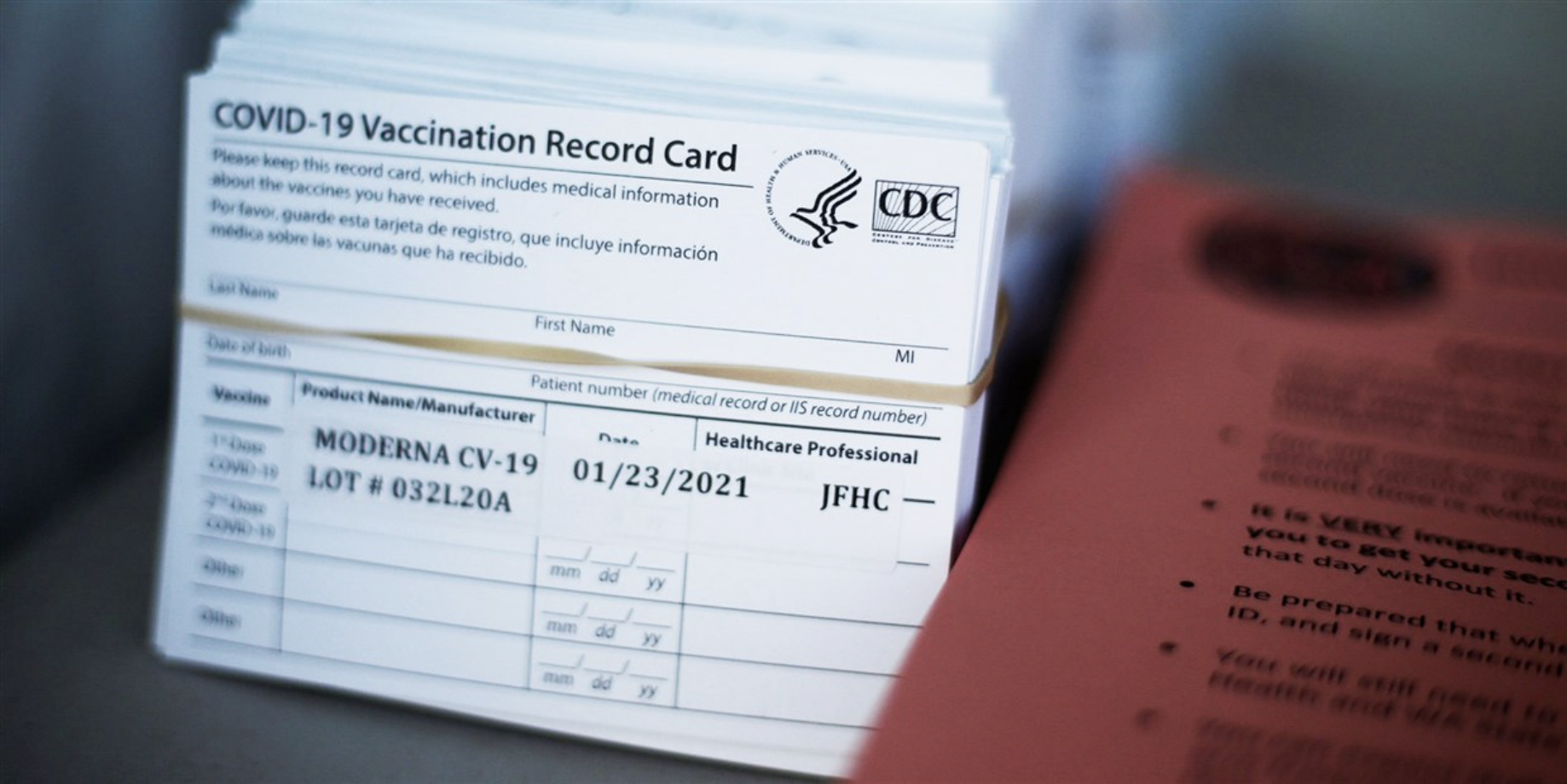You thought your ID and passport were your most precious travel documents. This summer add a small white piece of paper, better known as your COVID Card, to the list.

Some destinations, cruise lines, and major sports venues are already requiring travelers to provide proof that they have been fully vaccinated against Covid-19. Other businesses, like Krispy Kreme, are offering free items and other perks to people who can prove they’ve been inoculated.
48 million Americans have been fully vaccinated against Covid-19, and the only proof the COVID vaccine was received is typically the paper vaccination record card with the CDC logo in the upper corner. The vaccination card tells what Covid-19 vaccine was received, the date and location where it was received. However, that information is not being stored in any centralized, easily searchable database. Possibly because of HIPAA (Health Insurance Portability and Accountability Act - health privacy) laws.
Should the card become lost, return to the vaccination site and ask for a replacement. “If you do not receive a Covid-19 vaccination card at your appointment, contact the vaccination provider site where you got vaccinated or your state health department to find out how you can get a card,” says the CDC website.
This can be easy if the vaccine was administered at a pharmacy chain but more difficult if it was received from traveling cross-state or inter-state and received at a drive-through or pop-up event.
All Covid-19 vaccination providers are required to report data within 72 hours into their state’s immunization system, so there should be a back-up record of vaccine issuance status there. The CDC has a list of the Immunization Information System (IIS) in each state, which is where to start should a replacement card be obtained or there is difficulty recalling the location or contact information of the facility.
Digital vaccine passports may become a reality in the future, but currently, a paper vaccination record card is an extremely valuable possession. Here are five easy ways to protect it for safekeeping.
Make a photocopy of the vaccination card.
First and foremost, make a duplicate of the card. Keep a hard copy on file in a safe place.
Laminate the CDC vaccination record card.
Laminating the vaccination card will make it more durable and protect it from wear and tear.
Laminate the with self-adhesive laminating sheets available at most office supply stores or have a professional laminate the vaccination card. Staples is providing free lamination of vaccination cards to customers who use the coupon code 81450. The promotion currently has no end date. Office Depot, which also owns Office Max, will laminate vaccination cards for free for all fully-vaccinated people through July 25.
Take a photo of the CDC vaccination record card.
“Keep your vaccination card in case you need it for future use,” says the CDC website. “Consider taking a picture of your vaccination card as a backup copy.”
Store an image of your Covid-19 vaccination record card in your photo library or a digital wallet on your smartphone, where it can be easily retrieved. As further backup, email a copy of the image and download it to your computer or laptop. This will come in handy if you plan to book travel or other activities that require attaching documents that prove you have been vaccinated.
Ask for a digital backup of your vaccination card.
If you were vaccinated at a pharmacy chain, ask for a digital copy of your vaccination record.
“Walgreens maintains digital copies of patient vaccination records and can verify vaccination status on behalf of patients in the event that a dose card is lost or damaged,” said Erin Loverher, a Walgreens spokesperson. “We are also exploring a number of ways to enhance the customer vaccine experience, including a digital dose card and tracker.”
Soon customers who get vaccinated at Walmart will also be able to verify their status with a branded smartphone app. “Our goal is to give customers vaccinated at Walmart free and secure digital access to their vaccine record and enable them to share that information with third parties seeking to confirm their vaccination status,” said John Furner, CEO, and president, Walmart U.S., in a statement.
Store your vaccination card on an app.
Many digital-identification apps allow storage of digital versions of health records, including a vaccination record card, on your phone, but choosing one with tight privacy controls is paramount. One reputable option is Airside’s Digital Identity & Health Passport App, which stores data only on the user’s encrypted device and allows users to control not only with whom they want to share their information but for how long.
Your state may soon have its own vaccine pass. New York State just launched the Excelsior Pass to fast-track the reopening of sports arenas, music venues, restaurants, and other businesses — and the platform could be rolled out to other states.
You can choose best how to protect your vaccination record. Just be sure to keep several copies — the paper copy and a digital copy — so that you have access to it in various situations and from multiple devices.









